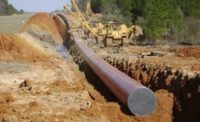A June 22 federal appeals court decision to throw out Federal Energy Regulatory Commission approval of an already built and operating natural gas pipeline adds new attention as the agency reconsiders its process to determine future need for such interstate lines.
The Washington, D.C., appellate court said that FERC failed to adequately balance public benefits with adverse impacts for the 65-mile, $287-million Spire STL pipeline—which links to the Rockies Express Pipeline system into St. Louis—when it says there was no new need for natural gas in the region, with flat demand seen for the next 20 years.
The ruling "shows when FERC cuts corners with its analysis, it puts its decisions and the investments made in reliance on those decisions at substantial risk,” said a statement by FERC Chairman Richard Glick, who dissented in the line's original 2018 approval.
Utility company Spire Inc. had sought arrangements with natural gas shippers, developers and others but got no responses. As a result, it entered into a so-called "precedent agreement" with its affiliate Spire Missouri for 87.5% of the pipeline’s capacity. Rather than for new capacity, the affiliate now uses the two-year-old pipeline instead of an older line to transport product. There was “plausible evidence of self-dealing,” the court said. The Missouri Public Service Commission was skeptical of the need for the project and asked FERC for a thorough review.
“The court was concerned with that,” says Natalie Karas, senior director and lead counsel at the Environmental Defense Fund, which challenged FERC’s decision. The court made it clear that FERC’s order had serious deficiencies, she says. Congress in the Natural Gas Act said FERC should only approve projects that are for “public convenience and necessity,” Karas contends. “This case breathes new life into those words,” she says.
Spire said in a statement that it relied on established FERC precedent to build the pipeline, which has been fully operational since 2019. “But three years after approval it appears that reliable and critical energy access to 650,000 homes and business throughout the St. Louis region now could be in jeopardy,” it said.
Spire cited the project's essential nature during February’s polar vortex “while other parts of the Midwest struggled with supply and extremely high costs."
The court sent the approval back to FERC to reconsider but questioned whether the agency could “rehabilitate” a decision with such serious deficiencies. The "ability to do so is not at all clear to us at this juncture,” the court said.
In his original dissent, Glick said there was nothing in the record to suggest that the proposed pipeline was needed.
FERC said it had broad discretion under the Natural Gas Act to balance competing interests, but the court said its decisions “may not go entirely unchecked.” In this case, “FERC failed to balance the benefits and costs,” the court said.
“Multiple agreements for service puts the pipeline developer on firmer ground for the project’s need,” says EDF’s Karas.
FERC currently is reviewing its process to assess and approve interstate pipelines, including responses to a Feb. 18 notice seeking comment on whether and how it should revise policy that dates to 1999.
EDF told FERC that since the policy was adopted, the natural gas market and U.S. energy system have gone through substantial changes “and are on the cusp of an even greater shift.”
The current process reflects the historic strong presumption of demand growth coupled with historic view of supply constraints existing at that time, EDF said. “Massive changes have uprooted these long-held presumptions,” the environmental group said.
The American Gas Association said FERC must build on the 1999 policy, which ensured a natural gas infrastructure capable of evolving and growing to meet changing needs. An updated policy can "determine the need for new pipelines as the country accelerates efforts to combat climate change,” it said, while noting that continued service is needed during the current energy transition.
The American Petroleum Institute told FERC that a revised policy must provide a clear approach that allows the natural gas industry to continue providing reliable supply to secure the power grid and also to remain an important participant in the global LNG market.
FERC said that after reviewing comments, it will determine whether to issue a proposed rulemaking.




